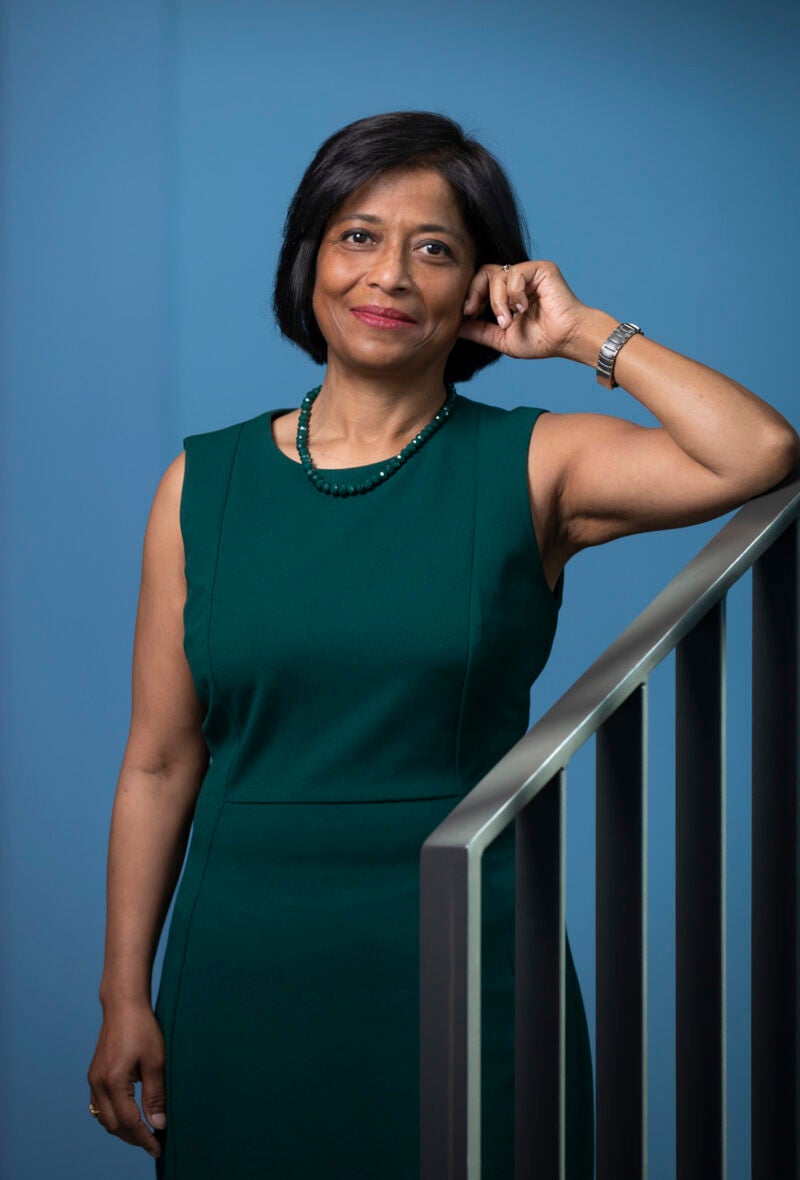When Joyeeta Gupta LL.M. ’88 was defending her doctoral thesis nearly 25 years ago, a Bangladeshi professor told her something she’s never forgotten. As a child, he said, he’d thought the English would never leave his country, yet one morning he woke up and they were gone. “So, he said never to forget that there could be a moment when suddenly the world changes,” Gupta said.
Gupta, a professor of environment and development in the global south at the University of Amsterdam, recently had her own life-changing moment when she was awarded the Spinoza Prize — the highest distinction in science in the Netherlands. And she plans to use the 1.5 million euro award for what she hopes will be a world-changing effort: developing a global governing document on social, environmental, and economic commitments.
“I want to move toward the elements that would be important for a global constitution in which we treat each other as equal human beings and we treat nature with respect,” said Gupta, who is presently working on a European Research Council grant on the role of large investors in phasing out fossil fuel.
“I had to reinvent myself, and the way to reinvent myself was to go into research.”
Gupta’s latest ambition reflects a career dedicated to thinking about global justice, with a special eye toward the relationship between the global north and global south. She was interested in consumer issues when she arrived at Harvard Law School in 1987, having worked at a consumer organization in India during the 1984 Bhopal disaster — a chemical accident that killed thousands and injured hundreds of thousands.
“That really sort of settled in my mind that I was going to go into environmental and consumer law,” she said. She wrote her Master of Laws thesis at Harvard on the sale in developing countries of pharmaceutical drugs that were banned or withdrawn in Western countries for health or safety reasons. Her year at Harvard was funded by a scholarship from the Inlaks Foundation, which she said freed her to carve out her own career path.
Gupta thought she might return to India to work on issues related to halting the exportation of toxic waste to developing countries, but she first went to the Netherlands to represent a Dutch nongovernmental organization working in that area. There she met and married her spouse, and the Netherlands became home to her multidisciplinary career. “I had to reinvent myself, and the way to reinvent myself was to go into research,” Gupta said.
She got a job as a climate change consultant at the Dutch Ministry of Environment before entering academia and in 1997 obtaining a Ph.D. focused on global conflict and consensus around climate change. Gupta went on to do extensive work in this area, serving as lead author in the Intergovernmental Panel on Climate Change, which won the Nobel Peace Prize in 2007 with Al Gore. She has also served as co-chair of the United Nations Environment Programme’s Global Environment Outlook 6: Healthy Planet, Healthy People and co-chair of the Earth Commission, which aims to establish scientific and just guardrails to support the planet’s life systems.
Gupta has carved out a broad academic path by developing expertise in a range of areas and has published papers that span disciplines. “I did try to make sure that every now and then I published a paper in a law journal, in a political science journal, in an environmental journal, even in Physics and Chemistry of the Earth and now Nature,” she said, adding that all her work has focused on how to improve equity.
Gupta was lead author on an Earth Commission paper published in March, for example, which proposed the concept of “Earth system justice,” a framework that aims to reduce the risks of global environmental change while ensuring nature’s benefits, risks, and related responsibilities are equitably shared among all people in the world.
Now, Gupta hopes to use at least part of the Spinoza Prize funding to set up a justice lab that would develop empirical support for positions on justice. The lab could be a place for scholars, lawyers, and judges to debate, or to test out questions such as what is acceptable in terms of how many people can be harmed (e.g., die or be displaced) as a result of an environmental issue such as climate change. She also wants to look at how the needs of all people can be met within the capacity of our environment and resources ranging from land to water to bees. “It needs hydrologists and it needs ecologists, it needs a whole bunch of people, and it needs quantitative and qualitative stories,” she said, to answer the question, “How do we create Earth system justice?”
The goal would be to craft a constitution that brings together ideas about how to use global resources to protect biodiversity, oceans, and minerals, as well as people; to ensure that all people can access basic resources and services; and to equitably share the remaining resources, risks, and responsibilities. She is particularly interested in thinking about how to use financial mechanisms such as investment and trade law along with human rights protections to bring about those ends.
Despite the far reach of her ambitions, Gupta said she is optimistic: “I think you have to just keep fighting and see if it works out. And if it doesn’t work out, I’ve at least tried.”
She recalled the period after she had completed her Ph.D. thesis and felt disheartened to uncover a lack of global consensus on climate change issues, particularly on who caused the problem, who was affected, and what instruments should be used to address it. “I was wondering — and I’m talking about 1997 — would we ever solve the climate change problem?”
That’s when her professor delivered his message about change — and how sometimes, it arrives when one least expects it. It’s a lesson she carries forward to this day.
